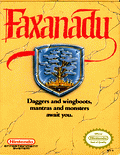
































Faxanadu

Faxanadu is an action role-playing platform-adventure video game for the Family Computer (Famicom) and Nintendo Entertainment System (NES). The name was licensed by computer game developer Nihon Falcom and was developed and released in Japan by Hudson Soft in 1987. In 1989, Nintendo of America released the game as a first-party title in the United States under license from Falcom and Hudson Soft. Nintendo also released the game to the European market in 1990.
Faxanadu can be considered a side-story of Xanadu, which is the second installment of Falcom's long-running RPG series, Dragon Slayer. The title Faxanadu is a portmanteau formed from the names Famicom and Xanadu.
The player-controlled protagonist of Faxanadu is an unidentified wanderer. He has no name, though the Japanese version allows the player to choose one. The game begins when he approaches Eolis, his hometown, after an absence to find it in disrepair and virtually abandoned. Worse still, the town is under attack by Dwarves. The Elven king explains that the Elf fountain water, their life source, has stopped and provides the protagonist with 1500 golds, the games currency, to prepare for his journey to uncover the cause.
As the story unfolds, it is revealed that Elves and Dwarves lived in harmony among the World tree until The Evil One emerged from a fallen meteorite. The Evil One then transformed the Dwarves into monsters against their will and set them against the Elves. The Dwarf King, Grieve, swallowed his magical sword before he was transformed, hiding it in his own body to prevent The Evil One from acquiring it. It is only with this sword that The Evil One can be destroyed.
His journey takes him to four overworld areas: The tree's buttress, the inside of the trunk, the tree's branches and finally the Dwarves' mountain stronghold.
Players guide the hero through a screen-by-screen series of fields, towns, and dungeons. The hero can walk, jump, and climb ladders – all typical characteristics of a platform game. Along the way, he may also purchase usable items with golds, equip and use bladed weapons against enemies, equip armor, and cast magic projectiles. In addition, he can access information regarding the game's events by speaking with townsfolk or by consulting other sources.
The limits of physical damage the hero can sustain from enemies is tracked by a life bar, and the magical power he can exert is tracked by a magic bar. These are listed on the top of the screen along with total experience, total golds, time (for items with a timed duration), and the currently held item.
When the hero defeats an enemy, it usually leaves behind golds or life-giving bread, and the hero gains a set amount of experience. Experience points help increase the hero's rank (see below). Occasionally, an enemy will also drop an item, some of which activate specific effects when touched and some of which can be stored for later use.
The game utilizes not a saved game system, but a password one, allowing players to stop and restart their journeys by entering a sequence of upper and lower case letters, numbers, and punctuation marks. Passwords, or 'mantras' as they are known in the game, can be obtained from church-dwelling Gurus. Gurus also bestow ranks to the hero when he meets certain experience totals; these determine the amounts of experience and golds a player will possess upon resuming a game via password as well as allowing the player to use certain pieces of equipment that are otherwise unequippable at lower ranks.
Because of its use of statistics, reliance on story, thematic basis upon Medieval fantasy, and provision of interactive NPCs, many observers have classified Faxanadu as a role-playing video game.
How to play:
Click on the joystick icon in the Faxanadu online emulator to see how to control the Faxanadu game









































Comments